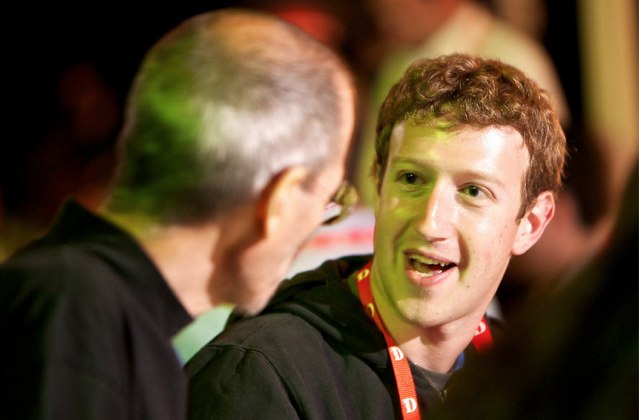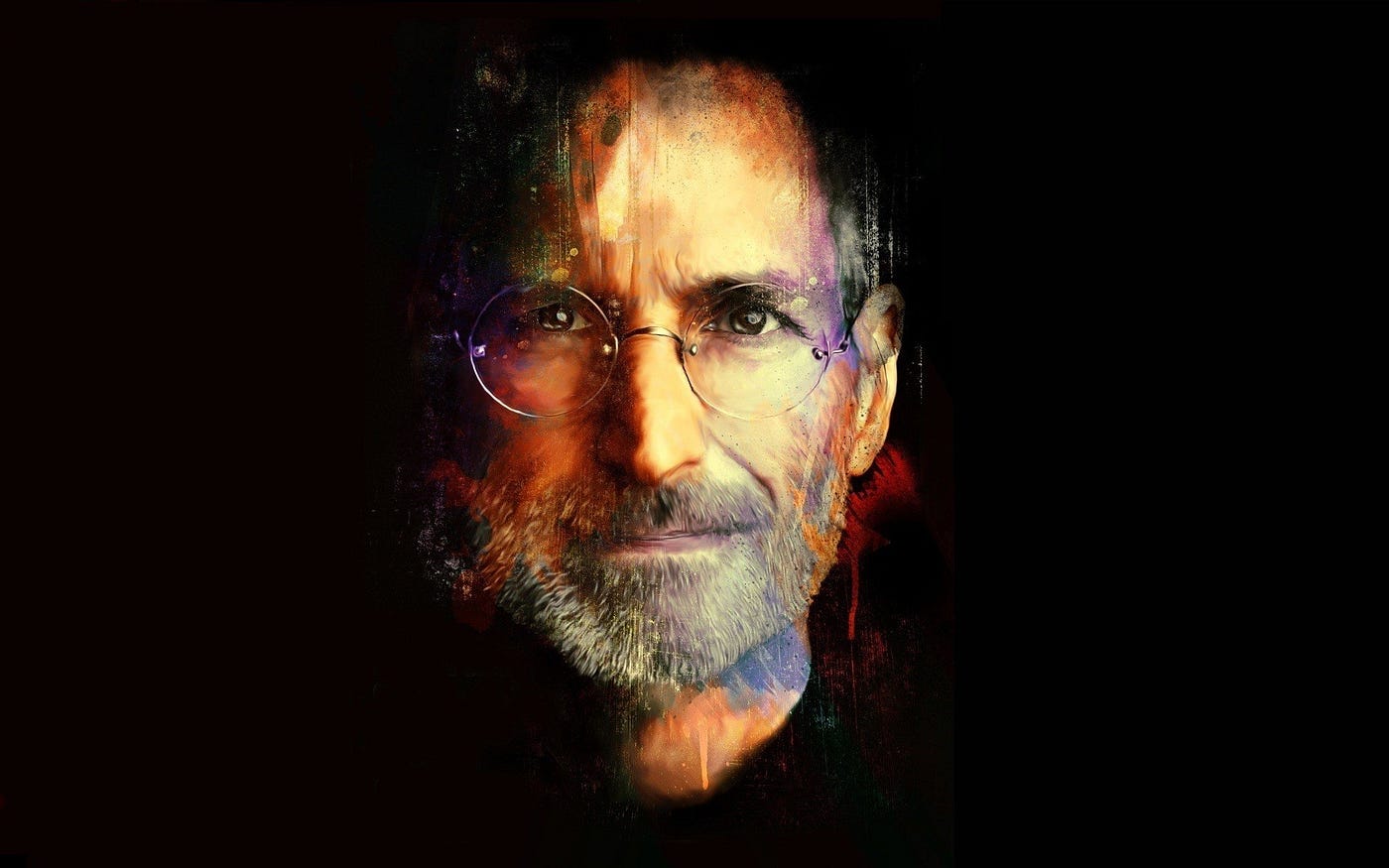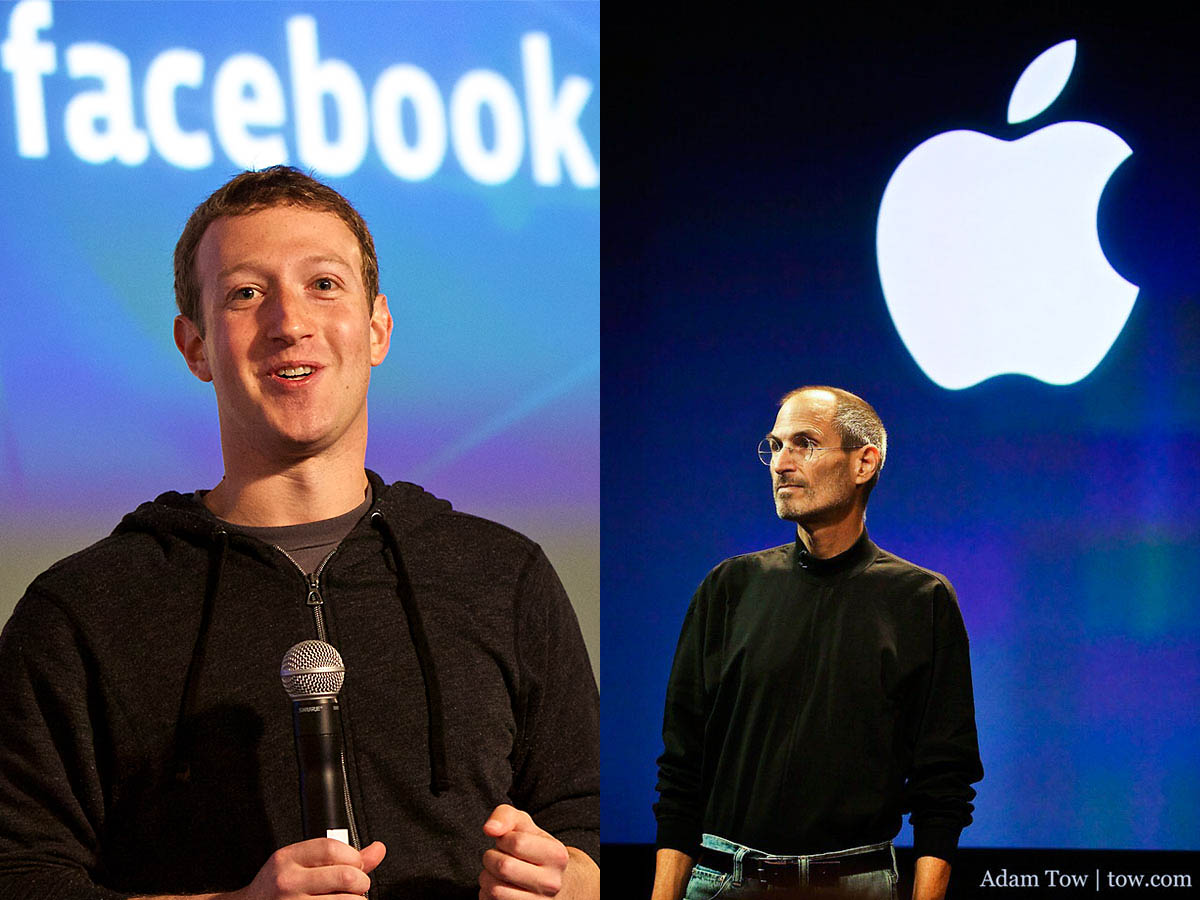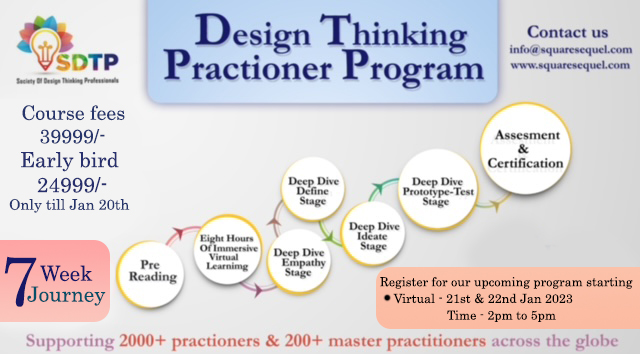In the early days of Facebook’s history, when the social media giant was navigating choppy waters, Mark Zuckerberg found himself at a crossroads. The pressures of success, coupled with mounting challenges, had created a rough patch for the young entrepreneur. It was during this critical juncture that he decided to seek guidance from Steve Jobs, a tech legend known for his transformative vision and unwavering commitment to excellence.
Zuckerberg vividly recalled this pivotal moment in his journey when he stated, “When things weren’t going well early on in Facebook’s history, we had reached a rough patch, and many people wanted to buy Facebook. I went to meet Steve Jobs, and he suggested that I go to this temple in India that he had visited early on in the development of Apple when he was contemplating what he wanted his vision of the future to be, to reconnect with what I believed to be the company’s mission.”
Steve Jobs’ recommendation for Zuckerberg to visit a temple in India was not just a casual piece of advice. It symbolized Jobs’ deep-rooted belief in the power of introspection and reconnecting with one’s core values and mission. This encounter marked the beginning of a mentorship that would prove invaluable for Zuckerberg.
Mark Zuckerberg, born May 14, 1984, in White Plains, New York, is the renowned co-founder and CEO of Facebook, now Meta Platforms, Inc. His journey began with a childhood passion for computers, leading to the creation of his first program at just 12. While at Harvard in 2004, he, alongside peers like Eduardo Saverin and Dustin Moskovitz, launched Facebook from his dorm room. This social media giant quickly swept through Harvard, then Ivy League campuses, and eventually the world, prompting Zuckerberg to drop out and focus on global expansion.
Steve Jobs, born February 24, 1955, in San Francisco, California, was the iconic co-founder of Apple Inc. In 1976, he and Steve Wozniak kickstarted the personal computing revolution with the Apple I and later the Macintosh, forever changing tech with its graphical user interface. Ousted in 1985, Jobs returned in 1997, unleashing a wave of innovation – from the iMac to iPhone – that reshaped consumer electronics. Both Zuckerberg and Jobs have indelibly shaped our digital world, proving that innovation and vision can change everything.
Legends Crossing Paths
Mark Zuckerberg and Steve Jobs crossed paths in the tech world when Facebook was in its early stages of development. In 2010, Facebook had already become a global phenomenon, but it faced challenges and was contemplating its future direction. During this pivotal time, Zuckerberg sought advice from industry leaders, and one of those he turned to was Steve Jobs.
Their first meeting reportedly took place during a dinner. It was during this meeting that Steve Jobs suggested to Zuckerberg that he should visit a temple in India. This temple, which Jobs himself had visited in his early days at Apple, was seen as a place for introspection and reconnecting with one’s core values and mission.
While their interactions weren’t constant mentorship, this encounter and exchange of ideas with Steve Jobs left a lasting impact on Mark Zuckerberg. It encouraged Zuckerberg to think more deeply about Facebook’s mission and long-term vision, which ultimately influenced the direction of the social media platform.
Though their paths crossed only briefly, the influence of Steve Jobs on Mark Zuckerberg can still be seen in the way Zuckerberg has approached product design, user experience, and leadership at Facebook (now Meta Platforms, Inc.). The wisdom and insights gained from this encounter have played a significant role in shaping Zuckerberg’s leadership and the trajectory of Facebook’s growth.
Lessons from the Tech Icon

Jobs saw that by mentoring Mark in rekindling his inspiration through his larger vision, he would be able to find meaning and purpose in the difficult circumstances he was facing and continue, even when it would have been simpler to sell out. In Zuckerberg’s words,
“I will always remember that [going to India] reinforced to me the importance of what we were doing.”
This is frequently how a mentor supports their mentees: by relying on personal experience and providing ongoing guidance to keep the mentee on the right path, one step at a time. Mark Zuckerberg’s interaction with Steve Jobs left a profound impact on his approach to business and leadership. Here are some of the key lessons that Zuckerberg learned from Steve Jobs and how he implemented them in his business.
Why start visionary initiatives?
Steve Jobs was renowned for his visionary approach to technology. He believed in thinking beyond the immediate needs of consumers and instead aimed to create products and technologies that could fundamentally change the world. Jobs had a knack for anticipating what people wanted even before they knew it themselves.
Mark Zuckerberg learned from Steve Jobs the importance of visionary thinking. Instead of merely reacting to the current market or consumer demands, Zuckerberg began to focus on a long-term vision for Facebook. He aimed to create a platform that would not just connect people socially but also have a profound impact on various aspects of society.
In 2013, Facebook launched Internet.org, an ambitious project to provide internet access to underserved and remote areas of the world. This project aimed to connect the entire world to the internet, aligning with the vision of making the world more connected and accessible.
In 2014, Facebook acquired Oculus VR, a company focused on virtual reality technology. This acquisition signaled Zuckerberg’s long-term vision of the role that virtual reality could play in communication, entertainment, and social interaction. It was a forward-looking move that demonstrated a commitment to shaping the future of technology.
Unlocking the MOC – Mind of the Customer
Steve Jobs was known for his unwavering commitment to creating products that not only performed well but also looked beautiful and provided exceptional user experiences. He believed that aesthetics and user-friendliness were crucial elements of successful technology. He once said, “I will go so close to my customer that I will be able to articulate their needs even before they can.” Here, he implied reaching the mind of the customer to breathe life into the user-centric designs with exquisite aesthetics.
Mark Zuckerberg and Facebook took this lesson to heart and began placing a stronger emphasis on user-centric design. They recognized the importance of making the platform more engaging and user-friendly, aligning with the principles of good design that Jobs had championed.
Facebook’s commitment to user experience and design was the redesign of the Facebook News Feed in 2013. Before the redesign, the News Feed was cluttered with a mix of posts, and its presentation lacked consistency. Facebook acknowledged that users were becoming overwhelmed with information and that the user experience needed improvement.
Mark said, “I want Facebook to be the best-personalized newspaper in the world.” And just like a newspaper editor, he wants Facebook’s “front page” to be more interesting, especially on mobile devices’ small screens.
The Facebook News Feed overhaul prioritized relevant and engaging content, departing from chronological posts. It featured a sleek, user-friendly design emphasizing aesthetics and simplicity, akin to Steve Jobs’ principles. Addressing the surge in mobile use, Facebook optimized the experience for mobile devices, aligning with Jobs’ seamless cross-platform philosophy. User feedback played a pivotal role, underscoring a user-centric approach reminiscent of Jobs’ belief in user-driven design.
Tolerance leads to indiscipline
Tolerance, when taken to an extreme, can indeed lead to indiscipline and a lack of focus. Steve Jobs firmly believed in the value of making tough decisions and sticking unwaveringly to his visionary goals. Mark Zuckerberg, influenced by Jobs’ leadership principles, learned a vital lesson about the importance of decisiveness and the necessity of making bold decisions when circumstances demanded it. This lesson profoundly transformed his approach to leadership.
The acquisition of Instagram in 2012 was a decision that sent shockwaves through the tech world. Instagram was a rising social media platform at the time, boasting a relatively small team but a rapidly growing user base and immense potential. Rather than tolerating the rise of a potential competitor, Zuckerberg made a bold and resolute move, acquiring Instagram for a staggering $1 billion.
In explaining the acquisition, Zuckerberg articulated his vision: “We’ve diligently worked for years to create the best photo-sharing platform for you to share with your loved ones. We can now collaborate with the Instagram team even more closely to provide the best opportunities for sharing stunning mobile photographs with individuals who share your interests.”
The Instagram co-founder, Kevin Systrom, echoed this sentiment, expressing optimism about the collaboration: “With the support and cross-pollination of ideas and talent at a place like Facebook, we hope to create an even more exciting future for Instagram and Facebook alike.”
This acquisition strategically eliminated competition, reinforcing Facebook’s position in the social media landscape. It aligned with Zuckerberg’s long-term vision of global connectivity and diverse social experiences through Meta Platforms, Inc. This bold move exemplified his strategic leadership and commitment to shaping the company’s future.
Get people who see their dream in yours
Jobs excelled at assembling teams of brilliant minds who shared his vision. In an interview with Charlie Rose, Mark shared the questions he asked Steve Jobs. He said, “Jobs was amazing, Apple is a company that is so focused on just building products for their customers.” I asked him, “How to build a team that is so focused on building as high quality and good things as you are?”
When Mark sought guidance from Jobs on building such high-caliber teams, he essentially sought to replicate this aspect of Jobs’ leadership. He understood that the key to achieving this level of commitment from a team was to bring in individuals who not only possessed technical prowess but also resonated with Facebook’s mission and values. He aimed to surround himself with people who saw their dreams aligned with the grander vision of Facebook. This emphasis on attracting top talent was pivotal in propelling the company’s growth and technological advancements.
He fostered an environment at Facebook that encouraged creativity and innovation. He encouraged employees to think outside the box, take risks, and push the boundaries of what was possible. This culture of innovation was key in developing groundbreaking products and features.
The acquisition of WhatsApp for $19 billion in 2014 portrays Mark’s commitment to building a strong team and expanding Facebook’s influence in the global messaging market. WhatsApp was not only a successful messaging platform but also had a talented team behind it. By acquiring WhatsApp, he not only gained access to a massive user base but also added more brilliant minds to Facebook’s roster.
Perseverance
Steve Jobs and Mark Zuckerberg, despite their immense success, faced their share of setbacks and controversies throughout their careers. Jobs imparted the crucial lesson of perseverance and resilience, emphasizing the importance of not giving up in the face of adversity.
Mark Zuckerberg took this lesson to heart, internalizing the value of viewing failures as opportunities for growth and maintaining the determination to persevere through challenges. This mindset shift influenced his approach to leadership and decision-making.
When Facebook was still a relatively young and rapidly growing platform, it faced significant competition from other social networking sites, particularly MySpace. MySpace was the dominant player in the social media landscape. However, Zuckerberg remained committed to his vision of creating a global social network that connected people. Despite the fierce competition and doubts from many quarters, he and his team continued to innovate and improve the Facebook platform.
Over time, Facebook’s persistence paid off. It not only survived the competitive landscape but ultimately overtook MySpace and became the world’s leading social media platform. Zuckerberg’s unwavering commitment to his vision and his ability to persevere through adversity played a pivotal role in Facebook’s rise to prominence.
The influence of Jobs’ philosophy and approach to business can be observed in the way Zuckerberg has led Facebook and its subsequent transformation into Meta Platforms, Inc. Zuckerberg’s willingness to seek guidance from a tech icon like Jobs and apply those lessons to his own company has been instrumental in shaping Facebook’s trajectory and its evolution into a global tech conglomerate.
What Can We Learn From These Legends?

Jobs saw that Mark Zuckerberg needed a clearer purpose and a compelling vision. He advised Mark to step away from the noise of meetings and go on a transformative journey to an ashram in India, much like Jobs had done in his early days of reimagining technology’s future. Mark took this advice to heart, spending a month at the ashram. This experience reinvigorated his belief in the power of connecting people. Upon his return, he was not only re-energized but also deeply committed to his mission. The rest, as they say, is history.
Understand the ‘why’
In the world of business, intense strategy meetings are indispensable. They stir up emotions, generate ideas, and challenge leaders to think beyond the status quo. Yet, both Steve Jobs and Mark Zuckerberg, despite their share of such charged gatherings, realized that these sessions alone couldn’t answer the most fundamental question—the purpose of their companies.
While numbers and arguments can address the “what” and “how,” they fall short when it comes to the “why.” To grasp “the why,” one must embark on the journey of reimagining the industry’s future. It’s here that the vision for an entire industry is conceived—a vision that is pivotal in shaping a company’s sustainable, leading, and inspiring vision.
Reflections: Fuel for Deep Quality Thinking
Both Steve Jobs and Mark Zuckerberg understood the power of solitude and took breaks from their hectic schedules to seek clarity. In the tranquil embrace of retreats, they contemplated the evolving industry and society dynamics.
For Jobs, this introspection revealed the supremacy of intuition over pure logic and intelligence, shaping Apple’s intuitive design ethos. Zuckerberg’s reflections highlighted the intrinsic human need for connection, crystallizing the importance of bringing people together.
In the serene settings, they reimagined their industries and their company’s purpose, illustrating the close bond between industry and company visions.
Vision-Driven Strategy
In many organizations, the concept of vision framing is recognized as essential but often misused. Instead of driving strategy, it becomes an afterthought, tacked onto the end of the process when the focus has shifted to communication. As a result, vision statements are perceived as mere marketing blurbs, not powerful tools for mobilizing teams, partners, and customers. To succeed, let’s prioritize great visions that lead to strategy, not the other way around.
Steve Jobs and Mark Zuckerberg both understood that to put out truly outstanding work, they needed to give their best effort. We leaders ought to do the same. Spend some time clearing your head, starting over, and getting a good night’s sleep. If you’re not completely ready to receive your dreams, they can’t come to you.
Steve Jobs, the mentor to several Silicon Valley technology leaders, expressed his admiration for Mark Zuckerberg and Facebook in an interview before his passing. Jobs commended Zuckerberg for his commitment to building a company and not succumbing to the temptation of selling out. He said, “I admire Mark Zuckerberg, I admire him for not selling out, for wanting to make a company. I admire that a lot.” He specifically lauded Facebook’s dominance in the social networking sphere, emphasizing that it was the singular force in the field. Jobs’ admiration for Zuckerberg’s dedication to his vision serves as a testament to the enduring spirit of innovation and perseverance that defines tech luminaries.
https://www.theguardian.com/technology/2013/aug/21/facebook-mark-zuckerberg-internet-org
https://www.nytimes.com/2013/03/08/technology/facebook-shows-off-redesign.html
https://www.inc.com/nicole-carter-eric-markowitz/facebook-buys-instagram-for-1-billion.html
https://www.linkedin.com/pulse/memorable-advice-from-steve-jobs-mark-zuckerberg-choudhary
https://miro.medium.com/v2/resize:fit:1400/1*QVgW7SO_y7zCrTJpKiVpYA.jpeg
Written By: Jimmy Jain
Edited By: Afreen Fatima
Society of Design Thinking Professionals









